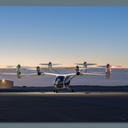Flying taxis get a big boost from military money

Next-generation aircraft companies are increasingly turning to the U.S. Defense Department to accelerate their path to commercial flight.
Why it matters: It can be difficult to earn regulatory approval — not to mention public acceptance — of newfangled flying machines like drones, flying taxis or supersonic jets. And investors usually aren't very patient.
- Military contracts can fill near-term revenue gaps and get test vehicles into the sky more quickly, helping to speed commercial development.
Driving the news: The latest example is Joby Aviation, which said last week that it is nearly doubling its existing contract with the U.S. Air Force's Agility Prime program.
- The program, created by the Air Force's innovation arm, works with private companies building innovative aircraft.
- The effort is meant to accelerate the development of electric vertical takeoff and landing aircraft (eVTOLs) for military and commercial use. (The U.S. military already uses gas-powered VTOLs, like Boeing's Osprey — though that aircraft is not without its issues.)
- Under the expanded contract, now worth up to $75 million, the U.S. Marine Corps will also test Joby’s eVTOLs in noncombat roles such as resupply, transport, and emergency medical response.
Between the lines: Joby executive chairman Paul Sciarra said the company's ultimate goal is still to launch a commercial air taxi service, but military business can help it get there by providing access to testing facilities, offering early operational experience, and offsetting some research and development costs.
- "We always thought it made sense to have a few shots on goal," he tells Axios.
- "This is about getting new technology to the Pentagon at a lower cost, and faster," he said. "But it also ties into a long history that the military is often a good first customer."
- And working with the U.S. Air Force or Marines will also help build consumer awareness and trust, he said, adding, "seeing them fly around on bases helps normalize them to consumers."
Other next-gen aviation companies have also turned to Defense Department contracts while working toward commercial deployment.
- Beta, another eVTOL company, earlier this year performed the first crewed eVTOL demonstration flights for Agility Prime.
- Boom Supersonic and Northrop Grumman are working on a supersonic special-mission aircraft that could be used by the government for rapid surveillance and reconnaissance, command and control, emergency medical evacuation, and troop transport.
- Skydio, a manufacturer of autonomous drones, struck a $100 million deal in February to supply drones to the U.S. Army.
- The parent of another drone company, Teal, won an Army contract in March to develop a next-generation autonomous drone system for surveillance and reconnaissance.
The big picture: The Defense Department has long invested in experimental aviation and transportation tech that it believes could give the U.S. a geopolitical edge over its rivals.
- The military is especially interested in eVTOLs because they're expected to be cheaper and easier to maintain than traditional helicopters — and quieter, too, which would help in stealth operations.
The bottom line: When you're inventing a new type of electric aircraft, diversification makes a lot of sense.